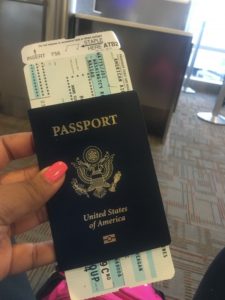What You Need To Know On Your First Trip Abroad
This post is sponsored by StudentCity and Her Campus Media. All opinions are my own. Thank you for supporting the brands that make Miss Millennia Magazine possible!
My first trip abroad is finally here and I cannot tell you how excited I am to share this epic opportunity with all of you! This is the first trip abroad in my life and it is actually a lot easier to do if you have the right people on your side. I traveled with my friend Kate and we had a ball. If you were not able to read my first article about StudentCity, I suggest that you check it out before continuing on with this one. StudentCity is the company who was able to make this trip possible for me in the first place. In that article, I generally go over what StudentCity is and how they make travel for students, like me, super easy. In this installment, I want to go into much more detail about my actual travel experience with them, including all of the parties and new experiences in Nassau, Bahamas. So, let’s get started!
Tip#1: Pack For International Travel: Get It Done Early!
I have to admit, I am definitely a procrastinator. I usually wait until the very last moment to begin or finish everything. Knowing this, my family implored that I at least begin packing a week early. According to them, having most of your things packed about a week before you leave for a trip allows you to double and sometimes even triple check that you have everything you will need. And when you procrastinate with your packing, you are often rushing to finish. So more than likely, you’ll probably forget that ultra chic sunhat that you’ve been dying to wear or the bare essentials, like a pair of flip flops! Here are a few things that I made sure to bring along for my beachside vacay:
- My Passport plus 2 copies (one in case I lose my passport and another to give to StudentCity staff)
- waterproof sunblock
- 3 of my favorite swimsuits
- shampoo & conditioner
- a fair amount of cash (you’ll never know when you’ll need it)
- a cute pair of sunglasses
- flip flops
- printed vouchers from StudentCity (these come into play A LOT)
Tip #2: Enjoy New Experiences
When you are traveling abroad, don’t forget to try new things. One of my favorite things to do is discover new things like music, places and food. So traveling to a brand new place is full of firsts! StudentCity had a lot of fun things planned. Two of my favorite things was that us Spring Breakers had the entire hotel to ourselves, and the private island party (both of which I will go into more detail about). I also loved that the StudentCity staff allowed us to leave the hotel during the day so we could explore a bit of downtown Nassau, too! That is where Kate and I did a bit of souvenir shopping and had a bit of lunch at The Hard Rock Cafe.
Private Island Party at Sandy Toes
Nothing is better than attending a private island party! It actually started when we got to the harbor where our party boat was waiting for us, music blazing. The 45-minute boat ride was all but tame and the party didn’t miss a beat when we arrived onto Sandy Toes. It was a gorgeous little island with littered with a ton of hammocks and bench swings. And because the water was a bit too choppy to actually swim, Kate and I took in the scenery from side by side hammocks with drinks in hand.
Tip #3: Make friends while you travel
A great part of travel is the atmosphere around you and fellow travelers. StudentCity booked the entire hotel just for its travelers during the week that I and my fellow Spring Breakers were staying there. Just that fact alone is crazy cool! But what is really awesome is that we could be as loud and wild as we wanted without any passing judgment.
Remember to be friendly with your fellow travelers but always be cautious. Especially in an unfamiliar setting out of the country, though it is great to make new friends to share the experiences with, not all people have good intentions.
Tip #4: Be Sure to Stay Safe
You always hear of horror stories about people being victimized while on their first trip abroad during Spring Break. Whether it be robbery, rape, or worse–many young people can be hesitant to travel as tourists since they are sometimes targeted as easy prey. But StudentCity has your back. StudentCity staffers, also known as the “Red Army” because of their bright red shirts and large numbers, are ever present. When Kate and I first arrived, we received our wristbands that had a number to call the Red Army 24/7. No matter where you go, there is always someone there to look out for you while you are at a StudentCity event. it is really nice to be able to sit back and enjoy your trip knowing that there is an extra pair of eyes looking out for you at all times of the day and night.
My Overall Thoughts About My First Trip With StudentCity
Spring Break is supposed to be carefree and memorable; when you take a trip with Student City, Spring Break is just that. The staff is so helpful and always makes you feel safe to enjoy the tropical breeze through your hair. All of the included amenities, like the water sports, private beach, and daily parties make the atmosphere vibrant and exciting. And, did I mention unlimited drinks? Need I say more?
If you are interested in booking your very own StudentCity getaway, whether it is your first trip abroad or not, check out their social media pages and this link as well and learn a bit more about them!
StudentCity Social Media
Twitter Handle: @StudentCity
Instagram Handle: @StudentCity
Facebook: https://www.facebook.com/studentcity
References
What Will You Be Doing For Spring Break 2016?
Request More Information Video
How To Plan Your Summer Travel Like A Boss
Inexpensive Hair Products For Naturally Curly Hair
This post is sponsored by StudentCity and Her Campus Media. All opinions are my own. Thank you for supporting the brands that make Miss Millennia Magazine possible!
Interested in learning more about planning your first trip abroad? Be sure to read The Rough Guide to First-Time Around The World.














